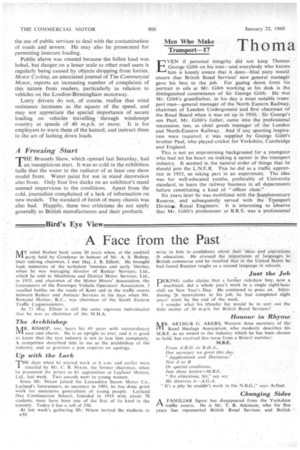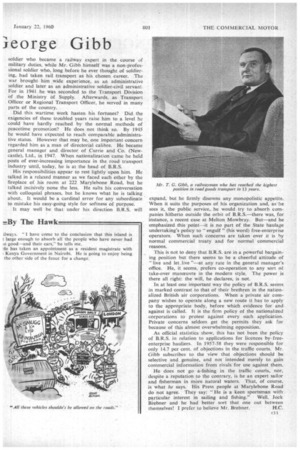Men Who Make
Page 48

Page 49

If you've noticed an error in this article please click here to report it so we can fix it.
Transport-17
Thoma leorge Gibb
EVEN if personal integrity did nOt keep Thomas 'George Gibb on his toes—and everybody who knows him is keenly aware that itdoes—filial piety. would ensure that British Road Services' new general manag"er gave his best to the job. For gazing down from his portrait in oils at Mr. Gib') working at his desk is the distinguished countenance of Sir George Gibb.. He was Mr. Gibb's grandfather, in his day a most notable trans= port man—general manager of the North Eastern Railway, chairman of London Underground and first chairman of the Road Board when it was set up in 1910. Sir George's son Paul, Mr. Gibb's father, came into the Professional succession, too, as chief goods manager of the London and North-Eastern Railway. And if any sporting inspiration were required, it was supplied by George Gibb's brother Paul, who played cricket for Yorkshire, Cambridge and England.
This is not an unpromising background for a youngster who had set his heart on making a career in the transport industry. It seemed in the natural order of things that he should join the L:N.E.R. This he did as a traffic apprentice in 1933, so taking part in an experiment. The idea was for well-educated youths, preferably of University standard, to learn the railway business in all departments before constituting a kind of "officer class."
Six years later he was mobilized with the Supplementary Reserve, and subsequently served with the Transport Divisice, Royal Engineers. It is interesting to Observe that Mr. Gibb's predecessor at B.R.S. was a professional soldier who became a railway expert in the course of military duties, while Mr. Gibb himself was a non-professional soldier who, long before he ever thought of soldiering, had taken rail transport as his chosen career. The war broughthim wide experience, as an administrative soldier and later as an administrative soldier-civil servant. For in 1941 he was seconded to the Transport Division 'of the Ministry of Supply. Afterwards, as Transport Officer or Regional Transport Officer, he served in many parts of the country.
Did this wartime, work hasten his fortunes? Did the exigencies of these troubled years raise him to a level he could have hardly reached by the normal methods of peacetime promotion? He does not think so. By 1945 he would have eXpected to reach comparable administrative status. However that may be, one important concern regarded him as a man of directorial calibre. . He became general manager and director of Currie and Co. (Newcastle), Ltd., in 1947. When nationalization came he held posts of ever-increasing importance in the road transport industry until, today, he is at the head of B.R.S.
His responsibilities appear to rest lightly upon him. He talked in a relaxed manner as we faced each other by the fireplace of his room at 222 Marylebone Road, but he talked incisively none the less. He salts his conversation with colloquial phrases, but he knows what he is talking about. It would be a cardinal error for any subordinate to mistake his easy-going style for softness of purpose.
It may well be that under his direction B.R.S. will expand, but he firmly disowns any monopolistic appetite. When it suits the purposes of his organization and, as he sees it, the public service,, he would try to absorb companies hitherto outside the orbit of B.R.S.—there was, for instance, a recent case at Melton Mowbray. But—and he emphasized this point—it is no part of the State haulage undertaking's policy to " engulf" (his word) free-enterprise operators. When such concerns are taken over it is hy normal commercial treaty and for normal commercial reasons.
This is not to deny that B.R.S. are in a powerful bargaining position but there seems to be a cheerful attitude of "live and let live "----at any rate in the general manager's office. He, it seems, prefers co-operation to any sort of take-over manceuvre in the modern style. The power is there all right: the will, he declares, is not.
In at least one important way the policy of B.R.S. seems in marked contrast to that of their brethren in the nationalized British air corporations. When a private air company wishes to operate along a new route it has to apply to the appropriate body, before which evidence for andagainst is called. it is the firm policy of the nationalized corporations to protest against every such application. Private concerns seldom get the permits they ask for because of this almost overwhelming opposition.
As official statistics show, this has. 'not been the policy of B.R.S. in relation to applications for licences byfreeenterprise hauliers. In 1957-58 they were responsible for only 14.7 per cent. of objections in the traffic courts. Mr. Gibb subscribes to the view that objections should be selective and genuine, and not intended merely to gain commercial information from rivals for use against them.
He does not go a-fishing in the traffic courts, nor, despite a reputation to the contrary, is he an expert sailor and fisherman in more natural waters. That, of course, is what he says. His Press people at Marylebone Road do not agree. They say: "He is a keen sportsman with
particular interest in sailing and fishing." Well, Jock Biebner and he had better sort that one out between themselves! I prefer to believe Mr. Brebner. H.C.












































































































































